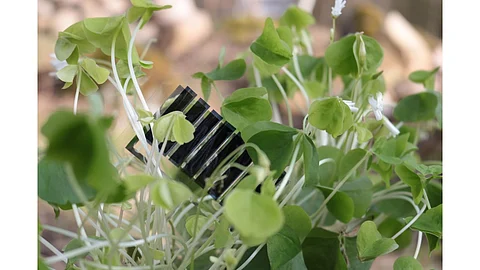

VTT-led research team has developed biodegradable solar modules that power low-energy sensors for agricultural use
It combines bio-based solar cells, compostable sensors, and supercapacitors for environmental monitoring in a sustainable manner
The solar cell is manufactured on a bio-based, thin-film substrate and partly from an inorganic structure
Finland’s state-owned research institute VTT Technical Research Centre has developed a biodegradable solar cell module, about the size of a credit card, that can power measurement electronics for agricultural use.
Created as part of an international green electronics research project, the compact, thin, and lightweight flexible module can be directly attached to a stem or a large leaf. It then decomposes naturally after the growing season within weeks or months. Its lifespan can be regulated by protecting the solar cell.
A biodegradable solution ensures that harmful substances don’t add to the microplastic waste in the soil.
The VTT-developed solar cell is manufactured on a bio-based, thin-film substrate and partly from an inorganic structure. It is less than 35 µm thick, and its thickness remains in tenths of a millimeter even with a protective layer.
The University of Tampere developed a supercapacitor that stores energy, with functions similar to a battery. The research team also developed compostable sensors and modules that transmit the collected data wirelessly.
Advanced measurement technology is increasingly deployed in agriculture to meet regulatory demands and support data-driven improvements in crop yields, disease control, and emission reduction.
According to the team that worked on the Transient Electronics for Sustainable ICT in Digital Agriculture (TESLA) project, the biodegradable cell can have wide application and can enable more real-time data collection and environmental monitoring.
“It's not about collecting a large amount of energy, but about sensors with low energy consumption that can monitor the state of the environment,” explained Senior Researcher at VTT, Marja Välimäki. “The ground-mounted solar cell is not intended to match the performance of ordinary cells, and a long service life is not required.”
VTT Senior Research Scientist Liisa Hakola added, “Although agriculture has been the practical test bed for this green electronics project, the overall idea is to examine how electronics can be made more environmentally friendly.”
The Finnish institute is also working on an EU-funded IoT research project called SUPERIOT, which aims to combine sensor technology with sustainable circular economy using environmentally friendly electronics and solar cells.
